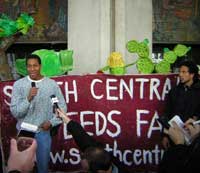L.A. farmers win a round in eviction fight
By
John Parker
Los Angeles
Published Mar 18, 2006 10:24 PM
A temporary stay of an
eviction of 350 family farmers in South Central Los Angeles was won March 9, due
to mounting pressure by the farmers and the citywide community—from South
Central to East Los Angeles to Hollywood—and the inclusion of some
prominent figures in the anti-war movement.
|
John Parker, left, speaks at rally.
At right, Zack de la Rocha, formerly
of Rage Against the Machine.
Photos: Jasper Yu
|
The terms of this stay hold as
long as the negotiations for the farm are still in pro gress. Even with these
limitations, given the city’s previous intransigence against the farmers
who were subject to daily threats of eviction by a ruthless developer, this
retreat by the city was a life-saving breath of reprieve.
“We are
now planning for the hearings with the city set for Monday, March 20, which will
consider our filing for the right of possession of the land,” said Rufina
Juarez, one of the principal elected representatives of the farm. “We will
continue our actions at the city council and elsewhere to keep up the pressure.
This is just a step in a long journey. It’s not over yet.”
|
L.A. farmers protest, March 10.
|
These families in South Central Los Ange les have been sustaining
themselves with a 14-acre community farm. They have had the legal right to work
on this land for 13 years, until now—due to an illegal eviction by the
city in favor of real estate developer Ralph Horowitz. The city had allowed this
South L.A. community to develop this land into a productive farm. About 10 years
later, the city secretly sold it to Horowitz for a little more than $5 million
in a back-room deal that was not sanctioned by the required public hearing.
Horowitz is now demanding $25 million for the property—an amount far out
of reach for the farmers.
Los Angeles County Sheriffs posted an eviction
notice on the fence near the entrance to the farm on March 1. The notice only
gave farmers until March 7 to vacate. Fortunately, a technical error was found
in the notice and an extension until March 13 had to be granted.
During
the time leading up to the eviction order, Mayor Antonio Villaraigosa had
consistently refused to meet with the farmers and, like the city council, said
the city’s hands were tied because the property belonged to Horowitz. One
mayoral assistant met with some of the farmers outside of the mayor’s
office at city hall just days before the first eviction deadline. The assistant
told them the city was having trouble trying to find the $25 million Horowitz
was demanding—a sum that amounts to a 500 percent gross profit by turning
around the sale of the now privately-owned property back to the
city.
Insensitive to the desperation and stress felt by the farmers facing
an impending deadline, the mayor’s official mouthpiece refused to answer
the question of why the city could not either look into the illegality of the
sale of the property or, using the claim of eminent domain, put a hold on the
evictions.
The city administration and mayor obviously needed a push from
workers, progressive organizations and individual activists—and
that’s what they got.
Unity and struggle won stay
On
March 5, with the eviction looming, farmers and their supporters held a planning
meeting to discuss emergency actions to defend the farm. A week of activities
was planned, which included protests at the city council, door-to-door
leafleting, draping of banners across major highway overpasses and confronting
the Mayor to demand that he use his power to stop the evictions.
Rosa
Romero of Axis of Justice in Los Angeles—an organization made up
predominantly of youth that deals with hun ger, homelessness and
sweatshops—was one of the primary organizers arranging daily actions of
protest against the evictions. She commented on how enthusiasm for the farmers
grew as the eviction threats increased. “In the last three weeks, since we
knew we had to raise awareness, more people were willing to come out to help
strategize, our web hits were doubling and our mailing list grew by 1,000 last
week alone. And our organizing meetings have grown with organizations bringing
more representatives.”
Part of the activities included a planned
demonstration on March 9, to be held at the mayor’s mansion by members of
the support committee of the farmers and the Los Angeles International Action
Center.
The IAC and Mindullae, a Korean youth organization led by Jamie
Kim, initiated a letter—signed by former U.S. Attorney General Ramsey
Clark; celebrities Ed Asner and Casey Kasem; Vietnam war veteran and author of
“Born on the Fourth of July” Ron Kovic and prominent activist
organizations in the city, all strongly supporting the right of the South
Central Farmers to the farm they built and calling for a March 9 protest in
front of the mayor's mansion.
When city officials learned of the possibly
large demonstration, they began pleading with and pressuring farmers to call off
the protest at the mayor’s mansion in exchange for temporarily halting the
eviction. An agency pledged $30,000 on behalf of the city to Horowitz in order
to stop the evictions until negotiations on the property were over.
Articles copyright 1995-2012 Workers World.
Verbatim copying and distribution of this entire article is permitted in any medium without royalty provided this notice is preserved.
Workers World, 55 W. 17 St., NY, NY 10011
Email:
[email protected]
Subscribe
[email protected]
Support independent news
DONATE


